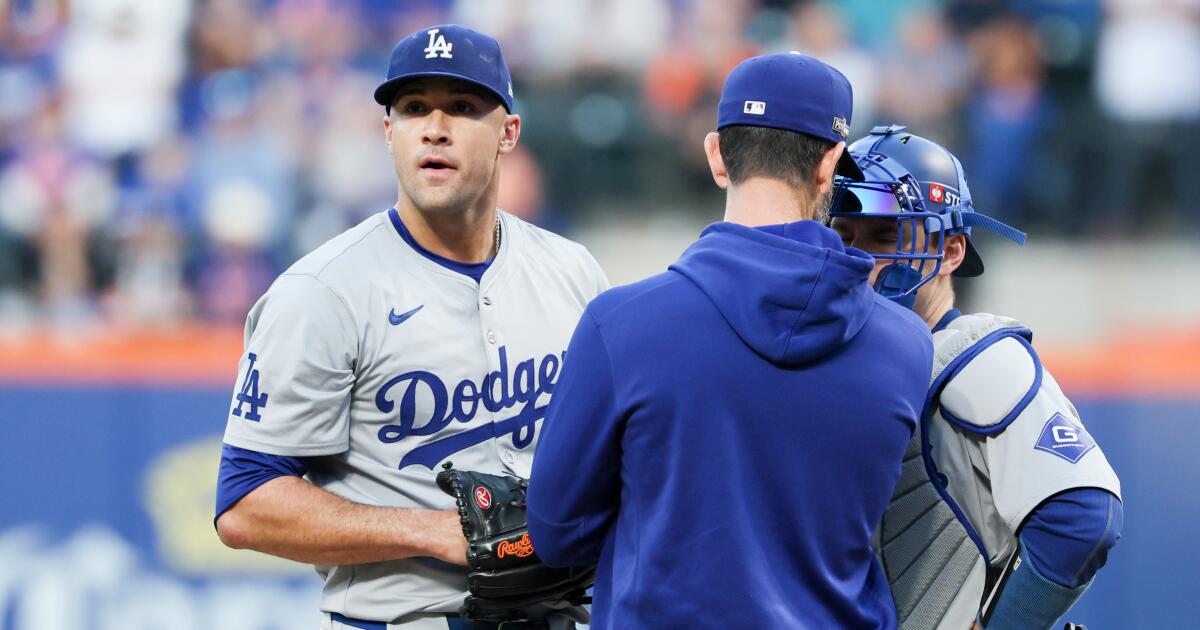In the aftermath of his team’s 12-6 defeat to the New York Mets on Friday night, Dodgers manager Dave Roberts lamented his inability to predict the future.
Because if Roberts had known Andy Pages would homer twice in Game 5 of the National League Championship Series, he would have removed starting pitcher Jack Flaherty earlier than he did.
When Flaherty encountered trouble in the third inning, Roberts might have turned to Daniel Hudson. Or perhaps Michael Kopech.
Instead, Roberts stuck with Flaherty, who gave up five more runs to increase the Dodgers’ deficit to 8-1. The loss reduced their advantage in the best-of-seven series to three games to two.
Roberts didn’t lack urgency. He lacked options.
Regardless of how well the Dodgers have pitched this month, what was true about them entering the postseason remains true. They have a shortage of arms.
Their starters can’t be counted on to take down a significant number of innings. The relievers they trust in high-leverage situations can be used only so many times.
The result is that Roberts can call on the likes of Blake Treinen or Evan Phillips only when the Dodgers are leading or tied. They can’t afford to waste any of their premium relievers in a loss.
As it is, they will have trouble covering nine innings to win and advance to the World Series, especially with left-handed reliever Alex Vesia sidelined because of a rib-cage injury.
“It’s not always fun when you’re going through it … certainly from my chair,” Roberts said. “But you have to kind of remain steadfast in how you use your pitchers because ultimately it’s about winning four games in a seven-game series.”
The Dodgers don’t play Saturday. They are expected to run a bullpen game Sunday in Game 6, which will be at Dodger Stadium. Walker Buehler is lined up to start the next day in a potential Game 7, which also would be at Dodger Stadium. Buehler lasted only four innings in his most recent start, meaning relievers could be pitching the majority of the innings Monday.
Deploying Treinen or Phillips on Friday could have compromised their availability or performance in those games.
The dynamics makes games like Friday’s extremely painful for Roberts to manage. From the first inning, it was obvious Flaherty didn’t have it. The average velocity of his four-seam fastball was only 91 mph, down almost 2 mph from the regular season.
Flaherty, who Roberts said was sick, served up a three-run home run to Pete Alonso in the first inning. Flaherty pitched a scoreless second but nearly gave up a homer to Francisco Lindor, who drove a ball to the right-field wall.
As Flaherty unraveled in the third inning, Roberts had a choice to make: punt on the game or turn to one of his high-leverage relievers to try to keep the score close. Knowing better than anyone how explosive his offense could be, he wanted to give the team a chance to win. However much he believed in his lineup, he also knew the odds were against the Dodgers coming back. The Dodgers could afford to lose. What they couldn’t afford was to lose and deplete their bullpen in the process.
“You know there’s a cost for the ensuing game,” he said.
So Roberts punted. Flaherty completed the third inning, and reliever Brent Honeywell pitched the next 4 ⅔ innings, ensuring the Dodgers wouldn’t have to use the pitchers they didn’t want to use.
The Dodgers remain in control of this series, but if this loss exposed anything, it was that Roberts has been performing a high-wire act this postseason. The Dodgers have almost no margin for error. The dominance of the bullpen hasn’t changed that. Neither have the surprisingly effective starts by Flaherty, Yoshinobu Yamamoto and Buehler.
Once again, president of baseball operations Andrew Friedman assembled a roster that would require Roberts to be perfect. Friedman made the same mistakes he made last year and the year before. His team is just getting away with it this time.

